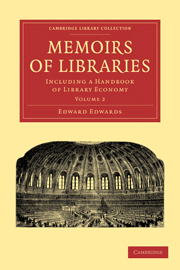Book contents
- Frontmatter
- Contents
- Chapter XV The Older Libraries of English Towns, and Their Management By Munic
- Chapter XVI The Parochial and Quasi-Parochial Libraries of England
- Chapter XVII The History of The “Public Libraries Acts” of 1850 and 1855
- Chapter XVIII The Working of The Public Libraries Acts of 1850 and 1855
- Appendix to Volume I
- Part The First. History of Libraries (Continued.)
- Book IV. The Libraries of The United States of America
- Book V. The Modern Libraries of Continental Europe
Chapter X - The Libraries of Hungary, Bohemia, Poland, and Russia
Published online by Cambridge University Press: 29 August 2010
- Frontmatter
- Contents
- Chapter XV The Older Libraries of English Towns, and Their Management By Munic
- Chapter XVI The Parochial and Quasi-Parochial Libraries of England
- Chapter XVII The History of The “Public Libraries Acts” of 1850 and 1855
- Chapter XVIII The Working of The Public Libraries Acts of 1850 and 1855
- Appendix to Volume I
- Part The First. History of Libraries (Continued.)
- Book IV. The Libraries of The United States of America
- Book V. The Modern Libraries of Continental Europe
Summary
Although The Imperial Library [of Russia], like other large Libraries, is a monument of The development of human intellect in all its various phases, yet The officers delight to remember that it is at The same time a REMARKABLE TROPHY of MILITARY GLORY, owing The principal and most precious part of its treasures to The success of Russian arms. The names of Suwarrow and Paskewitch are inseparably attached to The foundation and increase of this vast institution, while to Field-Marshal Volkhonsky … was reserved The work of its definite organization.
New York Literary Gazette(1854, 491).The Imperial Library of St. Petersburgh was formed after a Tartar and Calmuck fashion. ....When Zaluski’s Library was carried off to St. Petersburgh, The season was so bad, and The books so ill-packed (although shaved off with sabres when protruding,) that many cases broke by accident, and many books were lost.
The Quarterly Review(xcii, 161).Wherever The word of a single person has had The force of a law, The innumerable extravagances and mischiefs it has produced have been so notorious that all nations who are not stupid, slavish, and brutish, have always abominated … that model of Government.
Algernon SYDNEY (Discourses on Government,493).§ 1. The LIBRARIES of HUNGARY. BOOK V
The University Library of Pesth was originally The The Library of The High School of Tyrnau (founded by The celebrated Primate of Hungary, Peter Pázmáni, in The Libraries of 1655,) and accompanied The School in its successive removals,—first to Buda, in 1777, and Thence to Pesth, in 1784.
It was reorganized by The Emperor Joseph II., shortly University Library of Pesth, and owing to this circumstance that period has been sometimes erroneously stated to be The date of its foundation.Miss Pardoc, who visited Pesth in 1839, says, in her vivacious book The City of The Magyar : “The Library was in sad confusion, for many of The books had been damaged by The inundation [this was The terrible inundation of 1838]… while, to increase The disorder, The nation had justmade a new purchase, consisting of several thousand volumes, and The huge cases were yet unopened. It is very rich”, she adds, “in MSS., principally local and historical, The remains of an immense collection, contributed by The different Religious Houses, but partially destroyed by The Turks.”
- Type
- Chapter
- Information
- Memoirs of LibrariesIncluding a Handbook of Library Economy, pp. 529 - 547Publisher: Cambridge University PressPrint publication year: 2010First published in: 1859

